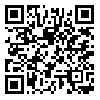BibTeX | RIS | EndNote | Medlars | ProCite | Reference Manager | RefWorks
Send citation to:
URL: http://rjms.iums.ac.ir/article-1-6383-en.html
Backgroiund and Aims: Today, customers are the most important assets of any organization and organizations that strive to have committed and loyal customers have taken a big step towards success (3). In the meantime, paying attention to important aspects of customer orientation can have positive and desirable effects on their decisions and behaviors and also subject customers' behaviors to fundamental changes (4). In this regard, one of the important functions of customer orientation and customer attention in industries and companies is to influence the behavioral tendencies of customers (5). Behavioral tendencies influence the behavior of influential people and increase the likelihood of performing a behavior and improve their loyalty, as well as the likelihood of customers buying (6, 7). Improving customer behavioral tendencies and adapting it to industry policies has been one of the constant concerns of managers. In an effort to align customer behavioral tendencies with the services provided by companies and organizations (8). The outbreak of Covid-19 virus has disrupted people's lives due to economic, social, occupational and psychological problems. Due to the lack of vaccines, non-pharmacological interventions are the only way to prevent the disease, which significantly affects the daily habits of the body, mental conditions, social and economic status (12). Meanwhile, the criteria of social distance, school closures and work environments challenge people and lead to many psychological problems that will have long-term effects (13). Coronary heart disease is now a pandemic. While this pandemic is spreading rapidly around the world, it has caused fear and anxiety among the general public (14). Also, the spread of this virus while involving industries has caused the world to face major challenges from an economic, political, social and cultural perspective (15).
Understanding the behavioral tendencies of customers in some markets, including the opening of child services in the event of a Quid-19 virus outbreak, can help to determine the current state of customer tendencies in these markets. This issue undoubtedly raises the necessary concern to respond to the above situation in order to improve the behavior and psychology of customers in the child service market. Therefore, the researcher is trying to answer the question, what is the state of behavioral and psychological tendencies of these people at the time of the outbreak of Quid-19 virus?
Methods: The present study was a descriptive-survey and applied research that was conducted in the field. The statistical population of this study consisted of all people related to child services in Gorgan, but unfortunately accurate statistics were not available. Based on the Cochran sample size formula in the uncertainty of the community, 384 people were identified as the research sample. To identify the research samples, we first referred to some stores active in the field of child services market in Gorgan. In selecting these stores, we tried to consider the geographical areas of Gorgan. After obtaining the necessary licenses to obtain initial information from some customers of these stores, the contact information of some of these customers was received and through the information system of the stores, the link of the research questionnaire was sent for research samples. Due to the possibility of a large drop in research samples, 400 text messages were sent to customers of the child services market in Gorgan. After distributing and collecting research questionnaires, 327 questionnaires were collected and analyzed. Data collection tools included the standard questionnaire of Bayrak et al. (2016) and the researcher-made psychological inclination questionnaire.
Finally, descriptive statistics, Smirnov clomograph test, one-sample t-test, independent t-test, one-way analysis of variance and Tukey's follow-up were used to compare the behavioral tendencies of the research samples. The whole process of data analysis was performed in SPSS software version 20.
Resaults: The results showed that there is a significant difference between the levels of behavioral and psychological tendencies and also the post hoc test between all groups in all components. Table 2 shows the results of the independent t-test on the status of behavioral and psychological tendencies at the time of the outbreak of Quid-19 virus according to gender characteristics. The results showed that there was a significant difference between the behavioral and psychological tendencies of male and female samples of child service market customers during the outbreak of Quid-19 virus. It was also found that the average behavioral and psychological tendencies of the research samples at the time of the outbreak of Quaid-19 virus were lower than 0.05, which indicates the undesirable behavioral and psychological tendencies of customers.
Conclusion: The present study showed that the level of behavioral and psychological tendencies of customers in the child services market at the time of the outbreak of Quid-19 virus among the research samples is significantly lower than the desired level (number 3). Low visibility of this disease not only threatens the physical health of people, but also affects the mental health of people, especially in terms of emotions and cognition. Prolonged negative emotions reduce a person's immune function and upset the balance of their normal physiological mechanisms. People may overreact to any illness, leading to avoidant behaviors. Uncertainty about the future also causes cognitive inconsistencies and insecurity, and people behave conservatively and cautiously when they feel threatened by illness (21). These cases may be the reason for the undesirable behavioral and psychological tendencies of customers






